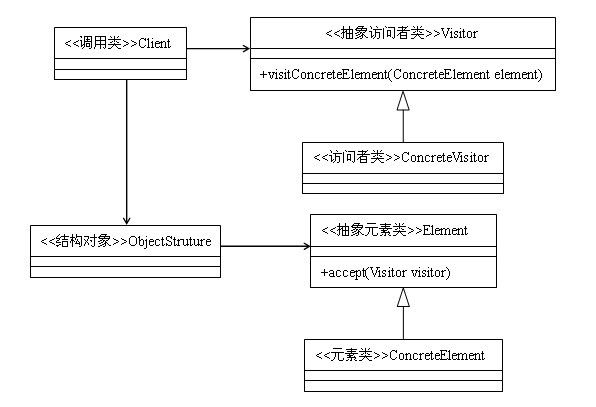- 设计模式--访问者模式【行为型模式】
码农爱java
设计模式设计模式访问者模式23种设计模式面试原理Java
设计模式的分类我们都知道有23种设计模式,这23种设计模式可分为如下三类:创建型模式(5种):单例模式、工厂方法模式、抽象工厂模式、建造者模式、原型模式。结构型模式(7种):适配器模式、装饰器模式、代理模式、外观模式、桥接模式、组合模式、享元模式。行为型模式(11种):策略模式、模板方法模式、观察者模式、迭代子模式、责任链模式、命令模式、备忘录模式、状态模式、访问者模式、中介者模式、解释器模式。设
- 设计模式--代理模式【结构型模式】
码农爱java
设计模式设计模式代理模式23种设计模式面试原理动态代理静态代理
设计模式的分类我们都知道有23种设计模式,这23种设计模式可分为如下三类:创建型模式(5种):单例模式、工厂方法模式、抽象工厂模式、建造者模式、原型模式。结构型模式(7种):适配器模式、装饰器模式、代理模式、外观模式、桥接模式、组合模式、享元模式。行为型模式(11种):策略模式、模板方法模式、观察者模式、迭代子模式、责任链模式、命令模式、备忘录模式、状态模式、访问者模式、中介者模式、解释器模式。设
- 设计模式--建造者模式【创建型模式】
码农爱java
设计模式设计模式建造者模式23中设计模式原理面试Java
设计模式的分类我们都知道有23种设计模式,这23种设计模式可分为如下三类:创建型模式(5种):单例模式、工厂方法模式、抽象工厂模式、建造者模式、原型模式。结构型模式(7种):适配器模式、装饰器模式、代理模式、外观模式、桥接模式、组合模式、享元模式。行为型模式(11种):策略模式、模板方法模式、观察者模式、迭代子模式、责任链模式、命令模式、备忘录模式、状态模式、访问者模式、中介者模式、解释器模式。设
- 设计模式--中介者模式【行为型模式】
码农爱java
设计模式设计模式中介者模式23种设计模式面试原理Java
设计模式的分类我们都知道有23种设计模式,这23种设计模式可分为如下三类:创建型模式(5种):单例模式、工厂方法模式、抽象工厂模式、建造者模式、原型模式。结构型模式(7种):适配器模式、装饰器模式、代理模式、外观模式、桥接模式、组合模式、享元模式。行为型模式(11种):策略模式、模板方法模式、观察者模式、迭代子模式、责任链模式、命令模式、备忘录模式、状态模式、访问者模式、中介者模式、解释器模式。设
- 设计模式--迭代器模式【行为型模式】
码农爱java
设计模式设计模式迭代器模式23种设计模式面试Java原理
设计模式的分类我们都知道有23种设计模式,这23种设计模式可分为如下三类:创建型模式(5种):单例模式、工厂方法模式、抽象工厂模式、建造者模式、原型模式。结构型模式(7种):适配器模式、装饰器模式、代理模式、外观模式、桥接模式、组合模式、享元模式。行为型模式(11种):策略模式、模板方法模式、观察者模式、迭代子模式、责任链模式、命令模式、备忘录模式、状态模式、访问者模式、中介者模式、解释器模式。设
- 设计模式--观察者模式【行为型模式】
码农爱java
设计模式设计模式观察者模式23种设计模式面试Java
设计模式的分类我们都知道有23种设计模式,这23种设计模式可分为如下三类:创建型模式(5种):单例模式、工厂方法模式、抽象工厂模式、建造者模式、原型模式。结构型模式(7种):适配器模式、装饰器模式、代理模式、外观模式、桥接模式、组合模式、享元模式。行为型模式(11种):策略模式、模板方法模式、观察者模式、迭代子模式、责任链模式、命令模式、备忘录模式、状态模式、访问者模式、中介者模式、解释器模式。设
- 设计模式--策略模式【行为型模式】
码农爱java
设计模式设计模式策略模式23种设计模式面试原理Java
设计模式的分类我们都知道有23种设计模式,这23种设计模式可分为如下三类:创建型模式(5种):单例模式、工厂方法模式、抽象工厂模式、建造者模式、原型模式。结构型模式(7种):适配器模式、装饰器模式、代理模式、外观模式、桥接模式、组合模式、享元模式。行为型模式(11种):策略模式、模板方法模式、观察者模式、迭代子模式、责任链模式、命令模式、备忘录模式、状态模式、访问者模式、中介者模式、解释器模式。设
- 设计模式--桥接模式【结构型模式】
码农爱java
设计模式桥接模式23种设计模式面试原理Java
设计模式的分类我们都知道有23种设计模式,这23种设计模式可分为如下三类:创建型模式(5种):单例模式、工厂方法模式、抽象工厂模式、建造者模式、原型模式。结构型模式(7种):适配器模式、装饰器模式、代理模式、外观模式、桥接模式、组合模式、享元模式。行为型模式(11种):策略模式、模板方法模式、观察者模式、迭代子模式、责任链模式、命令模式、备忘录模式、状态模式、访问者模式、中介者模式、解释器模式。设
- 设计模式--组合模式【结构型模式】
码农爱java
设计模式设计模式组合模式23种设计模式面试原理Java
设计模式的分类我们都知道有23种设计模式,这23种设计模式可分为如下三类:创建型模式(5种):单例模式、工厂方法模式、抽象工厂模式、建造者模式、原型模式。结构型模式(7种):适配器模式、装饰器模式、代理模式、外观模式、桥接模式、组合模式、享元模式。行为型模式(11种):策略模式、模板方法模式、观察者模式、迭代子模式、责任链模式、命令模式、备忘录模式、状态模式、访问者模式、中介者模式、解释器模式。设
- 设计模式--原型模式【创建型模式】
码农爱java
设计模式设计模式原型模式23种设计模式Java原理面试
设计模式的分类我们都知道有23种设计模式,这23种设计模式可分为如下三类:创建型模式(5种):单例模式、工厂方法模式、抽象工厂模式、建造者模式、原型模式。结构型模式(7种):适配器模式、装饰器模式、代理模式、外观模式、桥接模式、组合模式、享元模式。行为型模式(11种):策略模式、模板方法模式、观察者模式、迭代子模式、责任链模式、命令模式、备忘录模式、状态模式、访问者模式、中介者模式、解释器模式。设
- 设计模式--抽象工厂模式【创建型模式】
码农爱java
设计模式设计模式抽象工厂模式原理面试23种设计模式JavaJava设计模式
设计模式的分类我们都知道有23种设计模式,这23种设计模式可分为如下三类:创建型模式(5种):单例模式、工厂方法模式、抽象工厂模式、建造者模式、原型模式。结构型模式(7种):适配器模式、装饰器模式、代理模式、外观模式、桥接模式、组合模式、享元模式。行为型模式(11种):策略模式、模板方法模式、观察者模式、迭代子模式、责任链模式、命令模式、备忘录模式、状态模式、访问者模式、中介者模式、解释器模式。设
- 【设计模式】【行为型模式】访问者模式(Visitor)
FLZJ_KL
设计模式设计模式访问者模式java
hi,我不是一名外包公司的员工,也不会偷吃茶水间的零食,我的梦想是能写高端CRUD2025本人正在沉淀中…博客更新速度++欢迎点赞、收藏、关注,跟上我的更新节奏当你的天空突然下了大雨,那是我在为你炸乌云文章目录一、入门什么是访问者模式?为什么需要访问者模式?怎么实现访问模式?二、访问者模式在源码中的运用ASM框架(Java字节码操作)三、总结访问者模式的优点访问者模式的缺点访问者模式的适用场景一、
- 行为型设计模式的全面解析
技术拾光者
设计模式设计模式行为型设计模式java
行为型设计模式是软件设计模式中的一种,主要关注对象之间的交互和职责分配。它们通过定义对象之间的通信方式,使得系统的结构更加清晰,代码更加易于维护和扩展。本文将对比总结11种常见的行为型设计模式,包括策略模式、观察者模式、命令模式、迭代器模式、模板方法模式、责任链模式、状态模式、解释器模式、中介者模式、备忘录模式和访问者模式。一,模板方法模式(TemplateMethodPattern)定义:模板方
- JAVA:访问者模式(Visitor Pattern)的技术指南
拾荒的小海螺
设计模式java访问者模式开发语言
1、简述访问者模式(VisitorPattern)是一种行为型设计模式,允许你将操作分离到不同的对象中,而无需修改对象本身的结构。这种模式特别适合复杂对象结构中对其元素进行操作的场景。本文将介绍访问者模式的核心概念、优缺点,并通过详细代码示例展示如何在实际应用中实现访问者模式。设计模式样例:https://gitee.com/lhdxhl/design-pattern-example.git2、什
- 设计模式之访问者模式详解(Visitor Pattern)
Missy Peng
设计模式
最复杂的设计模式,并且使用频率不高,《设计模式》的作者评价为:大多情况下,你不需要使用访问者模式,但是一旦需要使用它时,那就真的需要使用了。访问者模式是一种将数据操作和数据结构分离的设计模式。(觉得太抽象,可以看下面的例子)。模式的定义与特点访问者(Visitor)模式的定义:将作用于某种数据结构中的各元素的操作分离出来封装成独立的类,使其在不改变数据结构的前提下可以添加作用于这些元素的新的操作,
- 【设计模式-行为型】访问者模式
博一波
设计模式访问者模式java
一、什么是访问者模式说起来访问者模式,其实很少用。我一直在思考该用什么样的例子把这个设计模式表述清晰,最近突然想到一个例子也许他就是访问者。港片有过很辉煌的年代,小的时候一直在看港片觉得拍的非常好,而且演员的演技也在线。不知道大家看没有看过一个金典的穿越剧----《寻秦记》,其中的项少龙(古天乐)就是专业的访问者。项少龙的经历可以很好地体现访问者模式的核心思想。项少龙作为一个现代人,穿越到战国时期
- 设计模式 23 访问者模式
WineMonk
#设计模式设计模式访问者模式
设计模式23创建型模式(5):工厂方法模式、抽象工厂模式、单例模式、建造者模式、原型模式结构型模式(7):适配器模式、桥接模式、组合模式、装饰者模式、外观模式、享元模式、代理模式行为型模式(11):责任链模式、命令模式、解释器模式、迭代器模式、中介者模式、备忘录模式、观察者模式、状态模式、策略模式、模板方法模式、访问者模式文章目录设计模式23访问者模式(VisitorPattern)1定义2结构3
- java设计模式---中介者模式
奔跑的扫地僧
Java设计模式java
首先我们了解下设计模式的总览:GoF提出的设计模式总共有23种,根据目的准则分类分为三大类:创建型模式,共五种:单例模式、工厂方法模式、抽象工厂模式、建造者模式、原型模式。结构型模式,共七种:适配器模式、装饰模式、代理模式、外观模式、桥接模式、组合模式、享元模式。行为型模式,共十一种:策略模式、模板方法模式、观察者模式、迭代器模式、责任链模式、命令模式、备忘录模式、状态模式、访问者模式、中介者模式
- 软考-常见的23种设计模式整理
ppliu600
软件架构数据仓库数据库数据挖掘
参考:23种设计模式总结设计模式可以将复用别人的解决方案。一、设计模式的分类创建型模式,共5种:单例模式、工厂方法模式、抽象工厂模式、建造者模式、原型模式。结构型模式,共7种:适配器模式、组合模式、代理模式、享元模式、外观模式、桥接模式、装饰器模式、行为型模式,共11种:观察者模式、策略模式、模板方法模式、迭代子模式、责任链模式、命令模式、备忘录模式、状态模式、访问者模式、中介者模式、解释器模式。
- 设计模式 15 解释器模式
WineMonk
#设计模式设计模式解释器模式
设计模式15创建型模式(5):工厂方法模式、抽象工厂模式、单例模式、建造者模式、原型模式结构型模式(7):适配器模式、桥接模式、组合模式、装饰者模式、外观模式、享元模式、代理模式行为型模式(11):责任链模式、命令模式、解释器模式、迭代器模式、中介者模式、备忘录模式、观察者模式、状态模式、策略模式、模板方法模式、访问者模式文章目录设计模式15解释器模式(InterpreterPattern)1定义
- 设计模式 18 备忘录模式
WineMonk
#设计模式设计模式备忘录模式
设计模式18创建型模式(5):工厂方法模式、抽象工厂模式、单例模式、建造者模式、原型模式结构型模式(7):适配器模式、桥接模式、组合模式、装饰者模式、外观模式、享元模式、代理模式行为型模式(11):责任链模式、命令模式、解释器模式、迭代器模式、中介者模式、备忘录模式、观察者模式、状态模式、策略模式、模板方法模式、访问者模式文章目录设计模式18备忘录模式(MementoPattern)1定义2结构3
- 设计模式- 代理模式(Proxy Pattern)结构|原理|优缺点|场景|示例
TsengOnce
设计模式设计模式代理模式
设计模式(分类)设计模式(六大原则)创建型(5种)工厂方法抽象工厂模式单例模式建造者模式原型模式结构型(7种)适配器模式装饰器模式代理模式外观模式桥接模式组合模式享元模式行为型(11种)策略模式模板方法模式观察者模式迭代器模式责任链模式命令模式备忘录模式状态模式访问者模式中介者模式代理模式(ProxyPattern)是一种结构型设计模式,它为其他对象(被代理对象)提供一个代理对象,并由代理对象控制
- 设计模式 11 享元模式
WineMonk
#设计模式设计模式享元模式
设计模式11创建型模式(5):工厂方法模式、抽象工厂模式、单例模式、建造者模式、原型模式结构型模式(7):适配器模式、桥接模式、组合模式、装饰者模式、外观模式、享元模式、代理模式行为型模式(11):责任链模式、命令模式、解释器模式、迭代器模式、中介者模式、备忘录模式、观察者模式、状态模式、策略模式、模板方法模式、访问者模式文章目录设计模式11享元模式(FlyweightPattern)1定义2结构
- 【访问者模式】设计模式系列:解锁复杂对象结构的秘密武器
无理 Java
#设计模式访问者模式设计模式行为型设计模式后端java面试
文章目录访问者模式详解:理论与实践1.引言1.1访问者模式的历史背景1.2模式的动机与应用场景1.3为什么选择访问者模式2.访问者模式概述2.1定义2.2问题场景2.3模式结构3.模式优缺点分析3.1优点3.2缺点4.访问者模式实现步骤4.1创建抽象元素接口4.2实现具体元素类4.3设计抽象访问者接口4.4开发具体访问者类4.5构建对象结构4.6示例代码分析5.案例研究5.1应用场景一:解析XML
- 设计模式(Kotlin)
找藉口是失败者的习惯
设计模式kotlin开发语言
设计模式创造型设计模式(5种)1、工厂方法模式2、抽象工厂模式3、单例模式4、建造者模式5、原型模式结构型设计模式(7种)1、适配器模式2、桥接模式3、组合模式4、装饰者模式5、外观模式6、享元模式7、代理模式行为型模式(11种)1、模板方法模式2、策略模式3、状态模式4、观察者模式5、备忘录模式6、迭代器模式7、访问者模式8、解释器模式9、责任链模式10、命令模式11、中介者模式以下我会以And
- 【Java设计模式】非循环访问者模式:简化对象交互
道长不会写代码
Java设计模式java设计模式访问者模式
文章目录【Java设计模式】非循环访问者模式:简化对象交互一、概述二、非循环访问者设计模式的意图三、非循环访问者模式的详细解释及实际示例四、Java中非循环访问者模式的编程示例五、非循环访问者模式类图六、Java中何时使用非循环访问者模式八、非循环访问者模式的优点和权衡十一、源码下载【Java设计模式】非循环访问者模式:简化对象交互一、概述在Java开发中,设计模式是提高代码质量和可维护性的重要工
- Java 22种设计模式详解
冲上云霄的Jayden
Javajava设计模式单例模式工程模式代理模式适配器模式桥接模式
22种设计模式详解创建型模式单例模式工厂方法模式抽象工厂模式建造者模式原型模式结构型模式适配器模式桥接模式组合模式装饰器模式装饰器模式与桥接模式代理模式代理模式与装饰器模式外观模式享元模式享元模式原理:享元模式角色:示例代码:行为型模式模板方法模式原理角色示例代码命令模式迭代器模式观察者模式中介者模式备忘录模式解释器模式状态模式策略模式访问者模式设计模式通常分为三类:创建型(Creational)
- 设计模式 7 桥接模式
WineMonk
#设计模式设计模式桥接模式
设计模式7创建型模式(5):工厂方法模式、抽象工厂模式、单例模式、建造者模式、原型模式结构型模式(7):适配器模式、桥接模式、组合模式、装饰者模式、外观模式、享元模式、代理模式行为型模式(11):责任链模式、命令模式、解释器模式、迭代器模式、中介者模式、备忘录模式、观察者模式、状态模式、策略模式、模板方法模式、访问者模式文章目录设计模式7桥接模式(BridgePattern)1定义2结构3示例代码
- 设计模式 2 抽象工厂模式
WineMonk
#设计模式设计模式抽象工厂模式
设计模式2创建型模式(5):工厂方法模式、抽象工厂模式、单例模式、建造者模式、原型模式结构型模式(7):适配器模式、桥接模式、组合模式、装饰者模式、外观模式、享元模式、代理模式行为型模式(11):责任链模式、命令模式、解释器模式、迭代器模式、中介者模式、备忘录模式、观察者模式、状态模式、策略模式、模板方法模式、访问者模式文章目录设计模式2抽象工厂模式(AbstractFactoryPattern)
- 设计模式 5 原型模式
WineMonk
八股文#设计模式设计模式原型模式
设计模式5创建型模式(5):工厂方法模式、抽象工厂模式、单例模式、建造者模式、原型模式结构型模式(7):适配器模式、桥接模式、组合模式、装饰者模式、外观模式、享元模式、代理模式行为型模式(11):责任链模式、命令模式、解释器模式、迭代器模式、中介者模式、备忘录模式、观察者模式、状态模式、策略模式、模板方法模式、访问者模式文章目录设计模式5原型模式(PrototypePattern)1定义2结构3示
- Maven
Array_06
eclipsejdkmaven
Maven
Maven是基于项目对象模型(POM), 信息来管理项目的构建,报告和文档的软件项目管理工具。
Maven 除了以程序构建能力为特色之外,还提供高级项目管理工具。由于 Maven 的缺省构建规则有较高的可重用性,所以常常用两三行 Maven 构建脚本就可以构建简单的项目。由于 Maven 的面向项目的方法,许多 Apache Jakarta 项目发文时使用 Maven,而且公司
- ibatis的queyrForList和queryForMap区别
bijian1013
javaibatis
一.说明
iBatis的返回值参数类型也有种:resultMap与resultClass,这两种类型的选择可以用两句话说明之:
1.当结果集列名和类的属性名完全相对应的时候,则可直接用resultClass直接指定查询结果类
- LeetCode[位运算] - #191 计算汉明权重
Cwind
java位运算LeetCodeAlgorithm题解
原题链接:#191 Number of 1 Bits
要求:
写一个函数,以一个无符号整数为参数,返回其汉明权重。例如,‘11’的二进制表示为'00000000000000000000000000001011', 故函数应当返回3。
汉明权重:指一个字符串中非零字符的个数;对于二进制串,即其中‘1’的个数。
难度:简单
分析:
将十进制参数转换为二进制,然后计算其中1的个数即可。
“
- 浅谈java类与对象
15700786134
java
java是一门面向对象的编程语言,类与对象是其最基本的概念。所谓对象,就是一个个具体的物体,一个人,一台电脑,都是对象。而类,就是对象的一种抽象,是多个对象具有的共性的一种集合,其中包含了属性与方法,就是属于该类的对象所具有的共性。当一个类创建了对象,这个对象就拥有了该类全部的属性,方法。相比于结构化的编程思路,面向对象更适用于人的思维
- linux下双网卡同一个IP
被触发
linux
转自:
http://q2482696735.blog.163.com/blog/static/250606077201569029441/
由于需要一台机器有两个网卡,开始时设置在同一个网段的IP,发现数据总是从一个网卡发出,而另一个网卡上没有数据流动。网上找了下,发现相同的问题不少:
一、
关于双网卡设置同一网段IP然后连接交换机的时候出现的奇怪现象。当时没有怎么思考、以为是生成树
- 安卓按主页键隐藏程序之后无法再次打开
肆无忌惮_
安卓
遇到一个奇怪的问题,当SplashActivity跳转到MainActivity之后,按主页键,再去打开程序,程序没法再打开(闪一下),结束任务再开也是这样,只能卸载了再重装。而且每次在Log里都打印了这句话"进入主程序"。后来发现是必须跳转之后再finish掉SplashActivity
本来代码:
// 销毁这个Activity
fin
- 通过cookie保存并读取用户登录信息实例
知了ing
JavaScripthtml
通过cookie的getCookies()方法可获取所有cookie对象的集合;通过getName()方法可以获取指定的名称的cookie;通过getValue()方法获取到cookie对象的值。另外,将一个cookie对象发送到客户端,使用response对象的addCookie()方法。
下面通过cookie保存并读取用户登录信息的例子加深一下理解。
(1)创建index.jsp文件。在改
- JAVA 对象池
矮蛋蛋
javaObjectPool
原文地址:
http://www.blogjava.net/baoyaer/articles/218460.html
Jakarta对象池
☆为什么使用对象池
恰当地使用对象池化技术,可以有效地减少对象生成和初始化时的消耗,提高系统的运行效率。Jakarta Commons Pool组件提供了一整套用于实现对象池化
- ArrayList根据条件+for循环批量删除的方法
alleni123
java
场景如下:
ArrayList<Obj> list
Obj-> createTime, sid.
现在要根据obj的createTime来进行定期清理。(释放内存)
-------------------------
首先想到的方法就是
for(Obj o:list){
if(o.createTime-currentT>xxx){
- 阿里巴巴“耕地宝”大战各种宝
百合不是茶
平台战略
“耕地保”平台是阿里巴巴和安徽农民共同推出的一个 “首个互联网定制私人农场”,“耕地宝”由阿里巴巴投入一亿 ,主要是用来进行农业方面,将农民手中的散地集中起来 不仅加大农民集体在土地上面的话语权,还增加了土地的流通与 利用率,提高了土地的产量,有利于大规模的产业化的高科技农业的 发展,阿里在农业上的探索将会引起新一轮的产业调整,但是集体化之后农民的个体的话语权 将更少,国家应出台相应的法律法规保护
- Spring注入有继承关系的类(1)
bijian1013
javaspring
一个类一个类的注入
1.AClass类
package com.bijian.spring.test2;
public class AClass {
String a;
String b;
public String getA() {
return a;
}
public void setA(Strin
- 30岁转型期你能否成为成功人士
bijian1013
成功
很多人由于年轻时走了弯路,到了30岁一事无成,这样的例子大有人在。但同样也有一些人,整个职业生涯都发展得很优秀,到了30岁已经成为职场的精英阶层。由于做猎头的原因,我们接触很多30岁左右的经理人,发现他们在职业发展道路上往往有很多致命的问题。在30岁之前,他们的职业生涯表现很优秀,但从30岁到40岁这一段,很多人
- [Velocity三]基于Servlet+Velocity的web应用
bit1129
velocity
什么是VelocityViewServlet
使用org.apache.velocity.tools.view.VelocityViewServlet可以将Velocity集成到基于Servlet的web应用中,以Servlet+Velocity的方式实现web应用
Servlet + Velocity的一般步骤
1.自定义Servlet,实现VelocityViewServl
- 【Kafka十二】关于Kafka是一个Commit Log Service
bit1129
service
Kafka is a distributed, partitioned, replicated commit log service.这里的commit log如何理解?
A message is considered "committed" when all in sync replicas for that partition have applied i
- NGINX + LUA实现复杂的控制
ronin47
lua nginx 控制
安装lua_nginx_module 模块
lua_nginx_module 可以一步步的安装,也可以直接用淘宝的OpenResty
Centos和debian的安装就简单了。。
这里说下freebsd的安装:
fetch http://www.lua.org/ftp/lua-5.1.4.tar.gz
tar zxvf lua-5.1.4.tar.gz
cd lua-5.1.4
ma
- java-14.输入一个已经按升序排序过的数组和一个数字, 在数组中查找两个数,使得它们的和正好是输入的那个数字
bylijinnan
java
public class TwoElementEqualSum {
/**
* 第 14 题:
题目:输入一个已经按升序排序过的数组和一个数字,
在数组中查找两个数,使得它们的和正好是输入的那个数字。
要求时间复杂度是 O(n) 。如果有多对数字的和等于输入的数字,输出任意一对即可。
例如输入数组 1 、 2 、 4 、 7 、 11 、 15 和数字 15 。由于
- Netty源码学习-HttpChunkAggregator-HttpRequestEncoder-HttpResponseDecoder
bylijinnan
javanetty
今天看Netty如何实现一个Http Server
org.jboss.netty.example.http.file.HttpStaticFileServerPipelineFactory:
pipeline.addLast("decoder", new HttpRequestDecoder());
pipeline.addLast(&quo
- java敏感词过虑-基于多叉树原理
cngolon
违禁词过虑替换违禁词敏感词过虑多叉树
基于多叉树的敏感词、关键词过滤的工具包,用于java中的敏感词过滤
1、工具包自带敏感词词库,第一次调用时读入词库,故第一次调用时间可能较长,在类加载后普通pc机上html过滤5000字在80毫秒左右,纯文本35毫秒左右。
2、如需自定义词库,将jar包考入WEB-INF工程的lib目录,在WEB-INF/classes目录下建一个
utf-8的words.dict文本文件,
- 多线程知识
cuishikuan
多线程
T1,T2,T3三个线程工作顺序,按照T1,T2,T3依次进行
public class T1 implements Runnable{
@Override
- spring整合activemq
dalan_123
java spring jms
整合spring和activemq需要搞清楚如下的东东1、ConnectionFactory分: a、spring管理连接到activemq服务器的管理ConnectionFactory也即是所谓产生到jms服务器的链接 b、真正产生到JMS服务器链接的ConnectionFactory还得
- MySQL时间字段究竟使用INT还是DateTime?
dcj3sjt126com
mysql
环境:Windows XPPHP Version 5.2.9MySQL Server 5.1
第一步、创建一个表date_test(非定长、int时间)
CREATE TABLE `test`.`date_test` (`id` INT NOT NULL AUTO_INCREMENT ,`start_time` INT NOT NULL ,`some_content`
- Parcel: unable to marshal value
dcj3sjt126com
marshal
在两个activity直接传递List<xxInfo>时,出现Parcel: unable to marshal value异常。 在MainActivity页面(MainActivity页面向NextActivity页面传递一个List<xxInfo>): Intent intent = new Intent(this, Next
- linux进程的查看上(ps)
eksliang
linux pslinux ps -llinux ps aux
ps:将某个时间点的进程运行情况选取下来
转载请出自出处:http://eksliang.iteye.com/admin/blogs/2119469
http://eksliang.iteye.com
ps 这个命令的man page 不是很好查阅,因为很多不同的Unix都使用这儿ps来查阅进程的状态,为了要符合不同版本的需求,所以这个
- 为什么第三方应用能早于System的app启动
gqdy365
System
Android应用的启动顺序网上有一大堆资料可以查阅了,这里就不细述了,这里不阐述ROM启动还有bootloader,软件启动的大致流程应该是启动kernel -> 运行servicemanager 把一些native的服务用命令启动起来(包括wifi, power, rild, surfaceflinger, mediaserver等等)-> 启动Dalivk中的第一个进程Zygot
- App Framework发送JSONP请求(3)
hw1287789687
jsonp跨域请求发送jsonpajax请求越狱请求
App Framework 中如何发送JSONP请求呢?
使用jsonp,详情请参考:http://json-p.org/
如何发送Ajax请求呢?
(1)登录
/***
* 会员登录
* @param username
* @param password
*/
var user_login=function(username,password){
// aler
- 发福利,整理了一份关于“资源汇总”的汇总
justjavac
资源
觉得有用的话,可以去github关注:https://github.com/justjavac/awesome-awesomeness-zh_CN 通用
free-programming-books-zh_CN 免费的计算机编程类中文书籍
精彩博客集合 hacke2/hacke2.github.io#2
ResumeSample 程序员简历
- 用 Java 技术创建 RESTful Web 服务
macroli
java编程WebREST
转载:http://www.ibm.com/developerworks/cn/web/wa-jaxrs/
JAX-RS (JSR-311) 【 Java API for RESTful Web Services 】是一种 Java™ API,可使 Java Restful 服务的开发变得迅速而轻松。这个 API 提供了一种基于注释的模型来描述分布式资源。注释被用来提供资源的位
- CentOS6.5-x86_64位下oracle11g的安装详细步骤及注意事项
超声波
oraclelinux
前言:
这两天项目要上线了,由我负责往服务器部署整个项目,因此首先要往服务器安装oracle,服务器本身是CentOS6.5的64位系统,安装的数据库版本是11g,在整个的安装过程中碰到很多的坑,不过最后还是通过各种途径解决并成功装上了。转别写篇博客来记录完整的安装过程以及在整个过程中的注意事项。希望对以后那些刚刚接触的菜鸟们能起到一定的帮助作用。
安装过程中可能遇到的问题(注
- HttpClient 4.3 设置keeplive 和 timeout 的方法
supben
httpclient
ConnectionKeepAliveStrategy kaStrategy = new DefaultConnectionKeepAliveStrategy() {
@Override
public long getKeepAliveDuration(HttpResponse response, HttpContext context) {
long keepAlive
- Spring 4.2新特性-@Import注解的升级
wiselyman
spring 4
3.1 @Import
@Import注解在4.2之前只支持导入配置类
在4.2,@Import注解支持导入普通的java类,并将其声明成一个bean
3.2 示例
演示java类
package com.wisely.spring4_2.imp;
public class DemoService {
public void doSomethin
